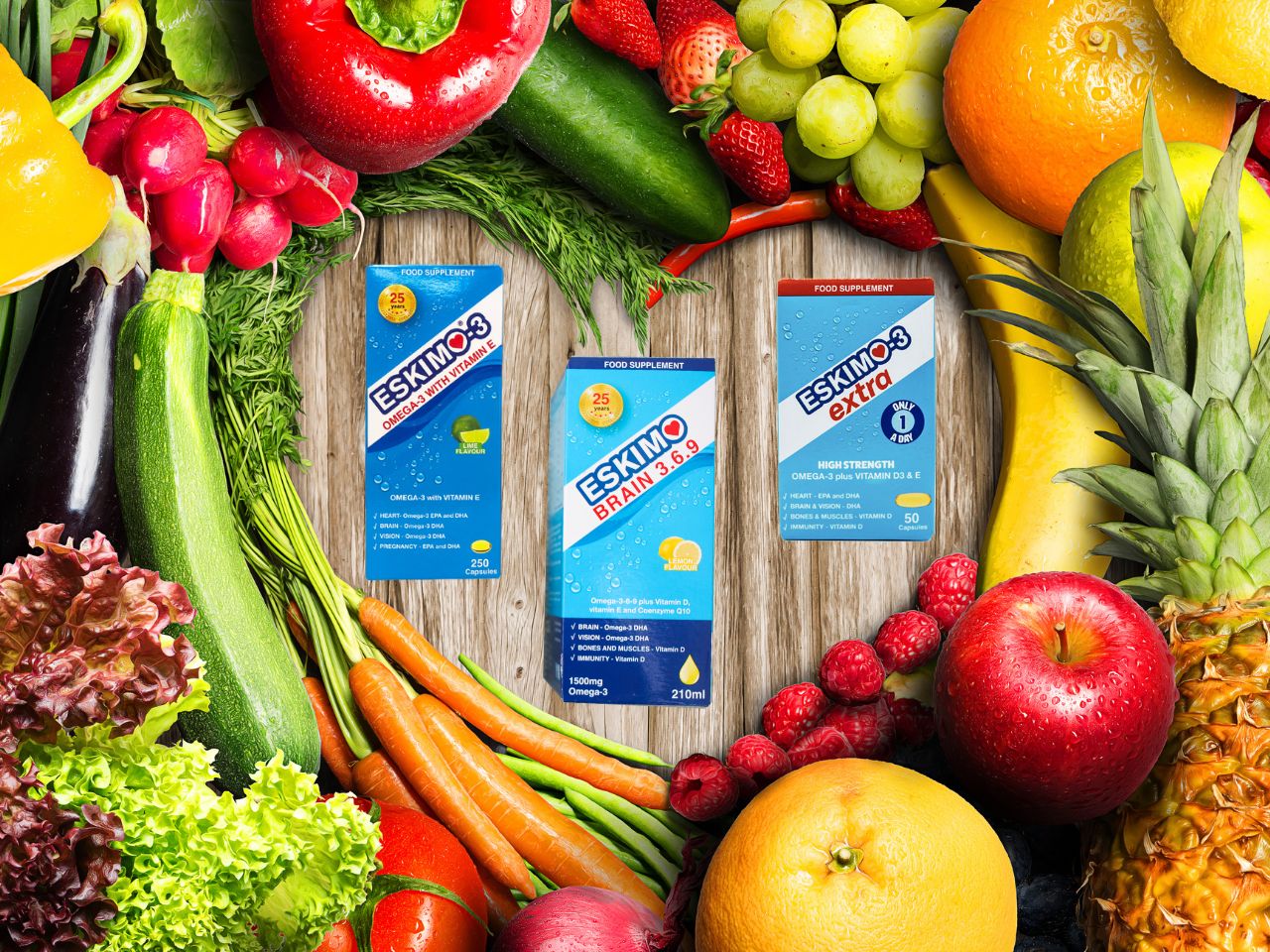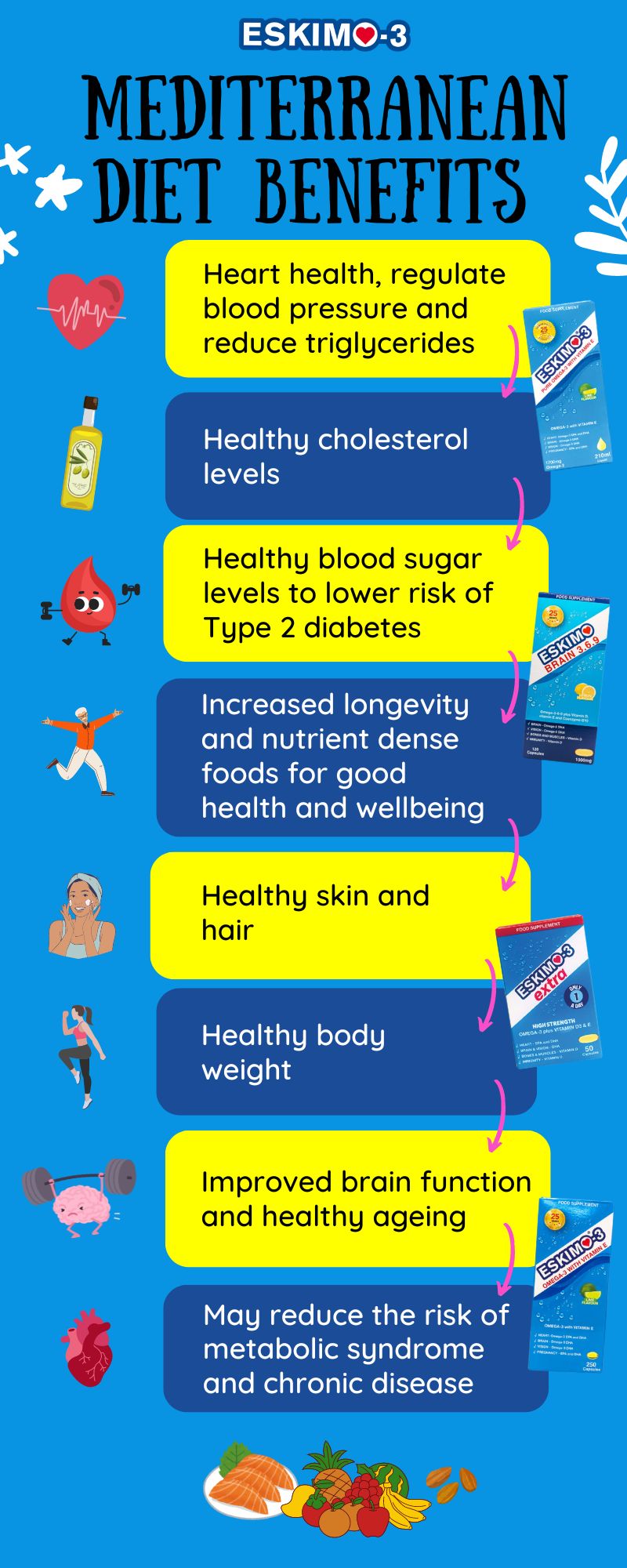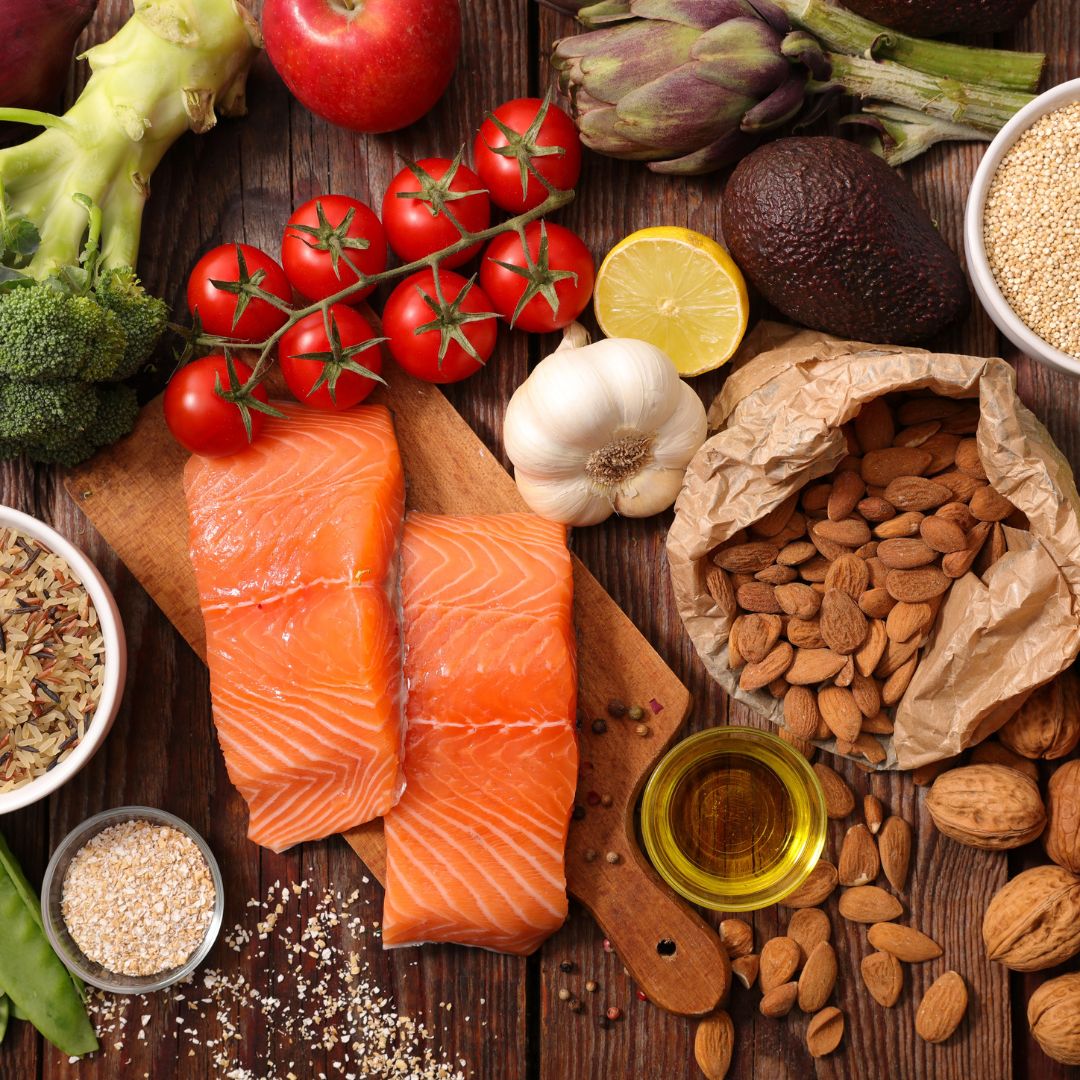The Mediterranean Diet
What is the Mediterranean diet? A healthy diet focused on fresh plant-based foods and healthy fats to provide long-term health benefits.
Guide to the Mediterranean Diet
The Mediterranean Diet is a healthy diet and way of life inspired by ancient dietary patterns. It focuses on fresh plant-based foods and healthy fats to provide nutrients for long, healthy lives with reduced risk of developing chronic diseases.
What is the Mediterranean Diet?
The Mediterranean diet is based on the traditional dietary patterns, eating habits and foods of the countries surrounding the Mediterranean Sea. These countries include southern Italy, Spain, Greece, and Crete.
The Mediterranean diet has long been considered one of the healthiest diets on the planet. The people in these regions tend to have a lower risk of many chronic diseases. In the early 1960s, it gained the attention of the medical community with several health publications about the extended health benefits for people over their lifetime.
The people of the Mediterranean do not think of their eating habits as a diet plan. It is considered a way of life that can lead to a long healthy life with less chance of chronic disease.
The Mediterranean diet focuses on plant-based foods such as vegetables and healthy fats such as fish rich in Omega-3 fatty acids.
Exercise and social interaction by eating meals with people are also important elements of the Mediterranean lifestyle.

Benefits of a Mediterranean Diet
What are the benefits of the Mediterranean diet? The benefits of the Mediterranean diet include:
1. Cardiovascular Health
It can help lower LDL cholesterol, regulate blood pressure and reduce triglycerides. This lowers the chances of developing Type 2 diabetes. This helps reduce the risk of coronary heart disease, and the risk of heart attack or stroke.
2. Healthy Cholesterol Levels
Eating a healthy diet and foods rich in essential Omega-3 fatty acids can help to lower your cholesterol for a healthy cholesterol level.
3. Healthy Blood Sugar Levels
Helps to stabilise blood sugar levels to lower the risk of developing Type 2 diabetes.
4. Increases Longevity and Good Health
The positive effects on heart health can lead to a long life with an increased lifespan due to better overall health. Also, the vast number of antioxidants present in the Mediterranean diet helps to protect the body from oxidative stress.
5. Nutrient Dense Foods for Good Overall Health and Wellbeing
The nutrient-dense foods provide an array of antioxidants, vitamins, minerals, and phytonutrients to promote positive health and well-being.
6. Healthy Skin and Hair
Eating healthy fats and high amounts of antioxidants will result in your skin and hair feeling more nourished and healthier than ever before.
7. Healthy Body Weight
Supports a healthy body weight for better health and well-being.
8. Improved Brain Function
The nutrients support brain health and healthy ageing. This can help protect brain function as we grow old by helping to slow down our cognitive decline.
9. May Reduce the Risk of Metabolic Syndrome
Metabolic syndrome is a group of conditions that combine to increase the risk of cardiovascular disease, Type 2 diabetes and stroke. Eating healthy can help lower your risk of metabolic syndrome.
Research into the Health Benefits of the Mediterranean Diet
Medical studies highlight that there are many long-term health benefits associated with the Mediterranean diet.
According to the Harvard T.H. Chan School of Public Health, “research has consistently shown that the Mediterranean diet is effective in reducing the risk of cardiovascular diseases and overall mortality.”
In 2022, “The Mediterranean Diet: An Update of the Clinical Trials” reviewed evidence from over a hundred clinical trials and studies into the MedDiet. It states that “evidence demonstrates the importance of the MedDiet, as the combination of a healthy dietary pattern and healthy behaviours.” It concluded that there were health benefits related to its anti-inflammatory and antioxidant properties. It can also help with obesity, and waist size and help improve overall public health.
According to a 2019 research paper, “The Mediterranean Diet: From an Environment-Driven Food Culture to an Emerging Medical Prescription”, there are “cardiovascular, metabolic, and cognitive” health benefits and the MedDiet is associated with “an improved quality of life”. Therefore, is “advised by a large majority of medical professionals” across the world.
The Basics of the Mediterranean Diet
So, how do you follow a Mediterranean diet? The basics of the Mediterranean diet focus on preparing healthy meals using fresh produce and avoiding as much processed foods as possible. While this may not always be possible, you should aim to follow an 80:20 system, so that you are giving your body good proper nourishment the majority of the time.
Foods to Eat on a Mediterranean Diet
What types of foods to eat on a Mediterranean diet? The foods to eat that are on a Mediterranean diet food list are healthy fresh unprocessed food. These include:
1. Fruits and Vegetables
Consume a rainbow of colour from eating fruits and vegetables. This will allow you to obtain as many antioxidants and phytonutrients as possible. These have anti-inflammatory and immune system-boosting benefits. Vegetables including dark green vegetables should be consumed 5 times a day. Fruit is often the dessert of choice in Mediterranean countries.
Blueberries are very high in antioxidants, low in calories, low in sugar and a great snack to keep your heart healthy. Avocados are packed with monounsaturated fat and antioxidants. They can help lower LDL levels while raising the amount of HDL cholesterol in your body.
2. Legumes
Beans, peas and lentils are legumes that are an integral part of the Mediterranean diet. They should be eaten daily at least 4 times per week. They are full of protein, soluble fibre and minerals. These foods are a powerhouse of health benefits for lowering cholesterol and supporting a healthy heart.
3. Nuts and Seeds
Nuts and seeds are nutrient-dense, which provides you with a lot of nutrition. Nuts are packed with vitamins, minerals, heart-healthy monounsaturated fats and low levels of saturated fats. An ounce of nuts and seeds is the recommended daily portion size.
4. Fish
Eat white or oily fish at least 2 to 3 times per week. Oily fish including salmon, sardines, herring, mackerel, and anchovies are rich in essential omega-3 fatty acids. These are beneficial for heart health, blood pressure, cholesterol, reducing triglycerides, blood circulation and brain function. It is recommended that you limit tuna intake to once per week, as it may be high in mercury.
5. Eskimo-3 Omega-3 Fish Oil Supplements
Omega-3 helps to keep blood pressure and cholesterol normal, reduces triglycerides and improves blood circulation. It also supports brain health, vision, and bones. In Ireland, most people do not eat enough white or oily fish. An Omega-3 supplement is recommended to ensure that you consume sufficient levels of essential Omega-3 fatty acids.
6. Olive Oil
Consuming olive oil is a key element of the Mediterranean diet, due to it being rich in olive oil polyphenols. These are powerful antioxidant compounds that help prevent bad LDL cholesterol from becoming oxidised. This makes it less likely to start clogging up the inside of the artery walls. It is recommended to make olive oil your primary source of dietary fat. Olive oil should be used in cooking, while Extra Virgin Olive Oil should be used over salad.
7. Wholegrains
It is recommended to avoid white refined carbohydrates. Instead, eat whole grain foods which are high in fibre and nutrients. These include brown rice, quinoa, buckwheat, and whole wheat tortillas.
8. Poultry and Eggs in Moderation
Eating eggs and poultry such as chicken, duck, and turkey is recommended in moderation. They can be eaten every 2 days.
9. Dairy Products in Moderation
Eating moderate amounts of dairy produce such as yoghurt, milk and cheese are often the dairy produce of choice.
10. Meat Seldomly
Eat red meat occasionally. Try to limit red meat consumption to 2 to 3 times a month.
11. Dark Chocolate in Moderation
Dark chocolate which is at least 70% cocoa can help the heart. It is rich in flavonoids, which helps to prevent plaque building up in the arteries.
Foods Not to Eat on a Mediterranean Diet
So, what foods should you avoid on a Mediterranean diet? Foods to avoid while living the Mediterranean Diet include:
1. Highly Processed Food
Avoid processed food. This is food that has been altered in some way during preparation. Processed food includes food labelled low-fat or diet, and food that was made in a factory. Choose real fresh food instead for better health.
2. Processed Meat
Try to avoid processed meats including bacon, sausages, hot dogs, packaged sandwich meat, packaged ham, pepperoni, salami and virtually all red meat used in frozen prepared meals.
3. Food with Added Sugars
Limit foods with added sugars such as sucrose, glucose, fructose, and corn. These added sugars increase calories but do not increase other nutrients such as vitamins and minerals. It is important to check whether added sugars are one of the first few items in the ingredients list, as this is not recommended. Avoid sweeteners such as aspartame. Foods high in sugar include soft drinks, sweets, chocolate (except dark chocolate), cakes, while hidden sugars appear in foods such as ready meals, prepared sauces, most cereals (granolas), bread and even pizza.
4. Refined Grains
Try to limit the intake of white refined grains such as white bread, pasta made with refined wheat, biscuits, bagels, and baguettes. These foods have a high Glycaemic index (GI), no fibre and are void of nutrients, whereas the wholegrain variety or more complex grains contain fibre, have a lower GI and contain vitamins and minerals.
The Glycaemic Index (GI) measures how fast and how much a type of food raises blood glucose levels. High GI hurts health, while low GI is favourable.
5. Trans Fats
A high intake of trans fats, derived from saturated fats found in animal products increases the risk of coronary heart disease. Many products such as margarine, and cakes, and biscuits contain it. In the blood, the trans fats are converted to triglycerides, which can increase cardiovascular problems if levels are high, and raise cholesterol levels.
6. Refined Oils
Avoid oils such as vegetable oil, soybean oil, corn oil, margarine and grapeseed oil. Instead choose more heart-friendly oils such as olive oil, rapeseed oil or coconut oil.
What to Drink on a Mediterranean Diet?
Hydration is very important for good health. So, what drinks can I include on a Mediterranean diet? The drinks to include are:
1. Water
Water is fundamental. You should aim to drink at least 6 to 8 glasses of water every day.
2. Tea and Coffee
Tea and coffee are also permitted.
3. Red Wine
If drinking alcohol, red wine could be drunk in moderation and with meals.
Drinks to Avoid on a Mediterranean Diet
Avoid sugary soft drinks and cordials on a Mediterranean Diet.
Also, alcohol consumption should be limited.

Mediterranean Diet Meal Plan
What is included in a Mediterranean Diet meal plan? There is no strict meal plan for a Mediterranean diet. However, an example of a meal plan for a Mediterranean diet breakfast, lunch, dinner and snacks for a week provided by the Zerochol Cholesterol Lowering Program could include:
1. Monday
- Breakfast: Porridge oats made using almond, oat or coconut milk, and topped with a tablespoon of seeds and blueberries. Also, enjoy a banana.
- Lunch: Minestrone soup served with a large salad.
- Dinner: Vegetable bean curry served with quinoa or brown rice and a handful of green leaves.
- Snacks: Sliced avocado and tomato on 2 wholegrain crackers.
- Drinks: Water, which can also include green tea, lemon hot water, lemon and ginger tea, and other non-fruit-infused teas.
2. Tuesday
- Breakfast: A poached egg on a slice of wholegrain toast. This can be served with spinach, mushrooms and tomato.
- Lunch: Vegetable bean curry served with quinoa or brown rice and green leaves leftover from the previous evening.
- Dinner: Turkey fillet cooked with 1 tablespoon of light Philadelphia, topped with pesto, and served with roasted vegetables (tomatoes, peppers, courgette, onion), and served with 2 baby potatoes.
- Snacks: 1 apple and a tablespoon of almond nut butter.
- Drinks: Water.
3. Wednesday
- Breakfast: Make a breakfast smoothie by blending a tablespoon of protein powder, a cup of spinach leaves, 2 apples with skin, a half cup of frozen raspberries, half an avocado, the juice of half a lemon, a half cup of almond or coconut milk, and 2 tablespoons of oats or chia seeds.
- Lunch: Broccoli soup served with a salad containing at least 4 vegetables.
- Dinner: Cod fillet served with stir-fried bell peppers and red onion. This can be served with brown rice and pesto on top.
- Snacks: Banana and chia bread.
- Drinks: Water.
4. Thursday
- Breakfast: Porridge oats made using almond, oat or coconut milk. This can be topped with a tablespoon of seeds and blueberries. Also, eat an apple.
- Lunch: Wholegrain wrap with pesto, salad, turkey slices, tomato, peppers, and a sprinkling of parmesan. Also, eat an orange.
- Dinner: Vegetable chilli con carne served with sweet potato.
- Snacks: 2 tablespoons of Hummus and Crudités (mixed chopped carrot, celery and green sugar snap peas).
- Drinks: Water.
5. Friday
- Breakfast: Breakfast smoothie.
- Lunch: Rice cake with tuna or sardines, and a cup of vegetable soup.
- Dinner: Thai red prawn or chicken curry made with reduced fat coconut milk, and served with brown rice and a sprinkle with fresh coriander.
- Snacks: 2 oatcakes with tahini and carrot sticks, and 4 pieces of dark chocolate.
- Drinks: Water.
6. Saturday
- Breakfast: A poached egg on a slice of wholegrain toast, served with spinach, smoked salmon and tomato.
- Lunch: Tomato and basil soup with a slice of wholegrain bread. Also, eat an apple.
- Dinner: Chicken stir fry with plenty of vegetables such as red peppers, yellow peppers, onion, sugar snap peas, carrot, or mushrooms. This can be served with rice noodles.
- Snacks: 2 tablespoons of hummus and crudités.
- Drinks: Water.
- Optional extra: Red wine: 1 or 2 glasses of red wine for up to 3 days.
7. Sunday
- Breakfast: 2 turkey rashers, salad leaves, beans, tomato and mushrooms.
- Lunch: Moroccan chickpea soup served with wholegrain bread.
- Dinner: Salmon fillet served with asparagus, carrots, and 2 baby potatoes.
- Snacks: Banana and chia bread.
- Drinks: Water.
Questions The Mediterranean Diet
- What is the Mediterranean diet?
The Mediterranean diet is a healthy diet based on the traditional dietary patterns, eating habits and foods of the countries surrounding the Mediterranean Sea. It can contribute to a long healthy life with less chance of chronic disease.
The diet focuses on fresh plant-based foods such as vegetables and healthy fats such as Omega-3 fatty acids. It avoids processed food, unhealthy fats and food with added sugars.
- What are the benefits of the Mediterranean diet?The benefits of the Mediterranean diet include:
- Cardiovascular Health
- Healthy Cholesterol Levels
- Healthy Blood Sugar Levels
- Increases Longevity and Good Health
- Nutrient Dense Foods for Good Overall Health and Wellbeing
- Healthy Skin
- Healthy Body Weight
- Improved Brain Function
- May Reduce the Risk of Metabolic Syndrome
- What foods are in the Mediterranean diet?The foods in the Mediterranean diet include:
- Fruits and vegetables
- Legumes
- Nuts and seeds
- White or oily fish
- Olive Oil
- Wholegrains
- Poultry and eggs in moderation
- Dairy products in moderation
- Meat seldomly
- Dark chocolate in moderation
- What is not allowed on a Mediterranean diet?Food and drink not allowed on a Mediterranean diet include:
- Highly processed food
- Processed meat
- Food with added sugars
- Refined grains
- Trans fats
- Refined oils
- Sugary soft drinks and cordials

